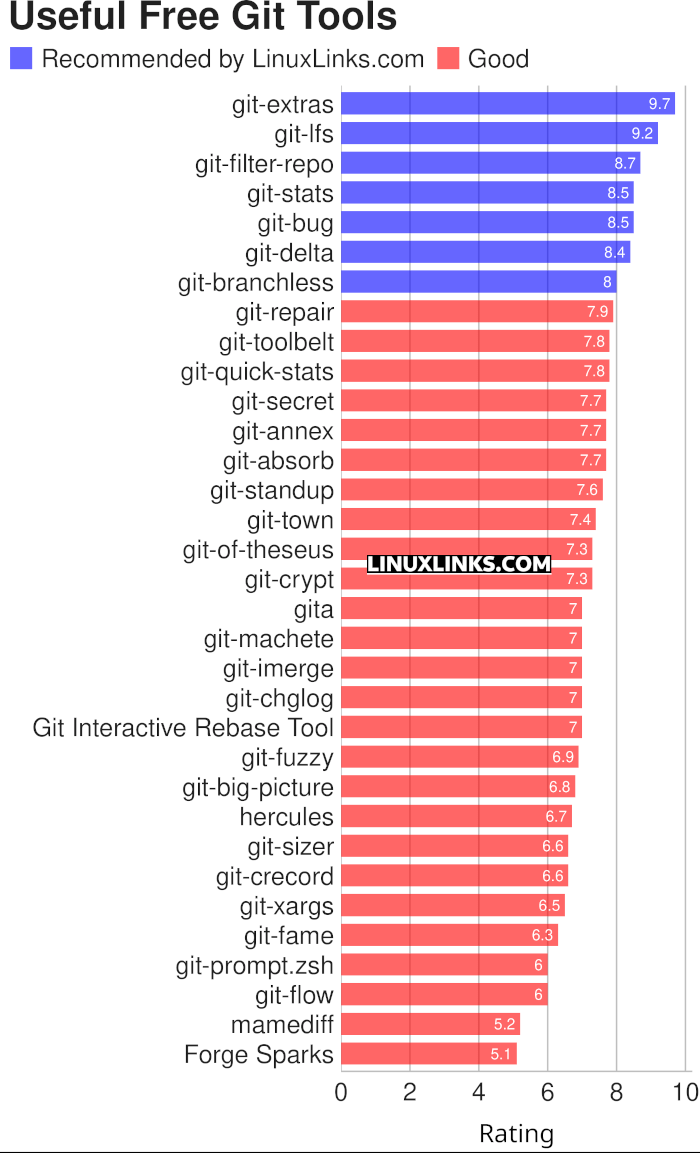Git is an open source distributed version control system which was originally designed by Linus Torvalds, the creator of Linux, in 2005 for Linux kernel development. This control system is widely used by the open source community, handling small to extremely large projects with an emphasis on speed and efficiency, but maintaining flexibility, scalability, and guaranteeing data integrity.
Git is one of a number of open source revision control systems available for Linux. Git is frequently regarded by many developers to be the finest version control tool available.
Most Linux distributions offer lots of secondary tools that add additional functionality. Like many things in Linux, the choice can be bamboozling. This article seeks to help identify tools which we’ve found to be very useful. They should be a good addition to maximise the benefits of using Git.
Here’s our verdict captured in a legendary LinuxLinks-style ratings chart. Only free and open source software is eligible for inclusion here.

Let’s explore the 33 Git tools at hand. For each title we have compiled its own portal page, a full description with an in-depth analysis of its features, together with links to relevant resources.
| Git Tools | |
|---|---|
| git-extras | Superb collection of tools for Git |
| git-lfs | Git extension for versioning large files |
| git-filter-repo | Quickly rewrite git repository history |
| git-stats | Local git statistics including GitHub-like contributions calendars |
| git-bug | Distributed offline-first bug tracker |
| git-delta | Viewer for git and diff output |
| git-branchless | Branchless workflow for git |
| git-repair | Repair various forms of damage to git repositories |
| git-toolbelt | Suite of useful Git commands |
| git-quick-stats | Access various statistics in a git repository |
| git-secret | Bash tool which stores private data inside a git repo |
| git-annex | Manage files with git without checking the file contents into git |
| git-absorb | Super-charging git rebase |
| git-standup | Recall what you did on the last working day |
| git-town | Automate the creation, synchronization, shipping, and cleanup |
| git-of-theseus | Analyze how a Git repo grows over time |
| git-crypt | Transparent file encryption in git |
| gita | Manage multiple git repos |
| git-machete | Robust tool that simplifies your git workflows |
| git-imerge | Incremental merge and rebase for Git |
| git-chglog | CHANGELOG generator implemented in Go |
| git-fuzzy | Interactive git with the help of fzf |
| git-big-picture | Visualization tool that removes uninteresting commits |
| hercules | Gain advanced insights from Git repository history |
| git-sizer | Compute various size metrics for a git repository |
| git-crecord | Interactively select changes to commit or stage |
| git-xargs | Update across multiple GitHub repositories |
| git-fame | Git repository collaborators sorted by contributions |
| git-prompt.zsh | Lightweight git prompt for zsh |
| git-flow | High-level repository operations |
| mamediff | Manages unstaged and staged Git diffs |
| Git Interactive Rebase Tool | Terminal-based sequence editor for interactive rebase |
| Forge Sparks | Get Git forges notifications |
This article has been revamped in line with our recent announcement.
 Read our complete collection of recommended free and open source software. Our curated compilation covers all categories of software. Read our complete collection of recommended free and open source software. Our curated compilation covers all categories of software. Spotted a useful open source Linux program not covered on our site? Please let us know by completing this form. The software collection forms part of our series of informative articles for Linux enthusiasts. There are hundreds of in-depth reviews, open source alternatives to proprietary software from large corporations like Google, Microsoft, Apple, Adobe, IBM, Cisco, Oracle, and Autodesk. There are also fun things to try, hardware, free programming books and tutorials, and much more. |
You might notice that Git clients are absent. That’s because we covered the finest free and open source Git clients and web-based Git clients in separate articles. And if you are new to Git or want to learn more, we suggest you read our article on the best free Git books.

